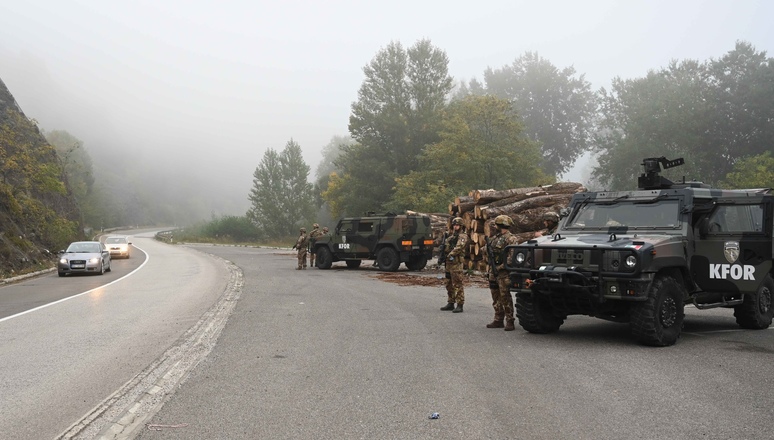The high-level meeting on Thursday in Brussels of the Belgrade-Pristina Dialogue which was supposed to reach a comprehensive normalization between Kosovo and Serbia and address current tension on the ground turned to another failed crisis-management meeting.
The meeting, chaired by EU foreign policy chief Josep Borrell and supported by EU Special Representative Miroslav Lajcak, had brought together Serbia’s President Aleksandar Vucic and Kosovo’s Prime Minister Albin Kurti. In concluding remarks after a long day of fruitless discussions, Borrell could not hide his disappointment.
“Let me say that today’s meeting was not a normal or regular meeting,” he said in a statement to media which was not followed by the usual opportunity for media to ask questions. “This was a meeting in a crisis-management mode. And the purpose of this meeting was to calm down the situation on the ground.”
He admitted that the current issues were the most pressing points on the agenda, apparently at the expense of talks on the elusive comprehensive agreement. “We are witnessing recent tensions over license plates and entry/exit documents for the people travelling between Kosovo and Serbia.“
“And unfortunately, we did not yet [come] to an agreement today. It is our responsibility and our duty to continue working in order to look for a solution that, unfortunately, today has not been possible.”
As previously reported, the issue of license plates for Serbian inhabitants in northern Kosovo and for Serbian vehicles entering Kosovo was supposed to have been solved last year but was allowed to linger on without any agreed permanent solution.
To de-escalate the tensions then, Kosovo and Serbia agreed to remove the special police units that were deployed at the crossings simultaneously with the roadblocks and apply stickers on the licenses plates of vehicles to remove national symbols.
Just a few days before yesterday’s meeting, EU’s spokesperson issued a statement calling on both sides to immediately put an end to inflammatory and dangerous rhetoric about war and start to act responsibly. “Senior politicians of the two parties will be held responsible for any escalation that leads to any increased tensions and, potentially violence in the region.”
Does the EU use its leverage in solving the bilateral issues between Kosovo and Serbia?
Asked about EU’s role in the EU facilitated dialogue, Peter Stano, EU’s lead spokesperson for foreign affairs, explained that it is not up to the EU to impose any solution on the parties, especially as they both have expressed clearly that their strategic objective is to join the EU.
“The accession process is the leverage the EU has,” he said. “Without progress in the dialogue, the accession process cannot advance. The dialogue is dealing with a lot of issues that are causing tension between the two countries but it is not a forced dialogue. We can facilitate as long as there is a willingness on both sides to find a comprehensive solution.”
"The Belgrade-Pristina dialogue is based on the assumption that both parties are willing to reach a bilateral treaty agreement on their future relations," Dr Thomas Bickl, an expert on Western Balkans, told the Brussels Times. “It looks like both parties have no political will to achieve that for the moment.”
“As long as that is the case, the EU accession process can only move forward on a technical level, and there will be no change of position of the five EU member states that don’t recognise Kosovo. In my view, those countries will only be ready to recognise Kosovo once there is an overall settlement with Serbia. There will be no EU accession for neither Serbia nor Kosovo as long as this issue is not solved."
If the situation would deteriorate further, it would be the first time in world history that hostilities are ignited because of license plates, the American ambassador to Serbia said last week. Normally war starts over national self-determination, sovereignty, land and natural resources.
One of the root causes to the tension in the relations between Kosovo and Serbia is the issue of decentralisation and local self-government for the Serbian minority in Kosovo. Serbian President Vucic claimed in a recent interview that Kosovo has refused to implement an agreement from 2013 on self-rule.
According to an EU spokesperson, EU is not funding decentralisation in Kosovo despite significant EU assistance. Since 2007, and up to the end of 2022, a total of €1.21 billion have been allocated to Kosovo. As for the rest of the Western Balkans, the EU funding for Kosovo is focused on supporting its socio-economic development as well as reforms to come closer to EU standards and values.
In April this year, EU earmarked an indicative €2 million to support small scale projects in support of good neighbourly relations between Serbia and Kosovo, including joint cultural activities that promote intercultural dialogue among different ethnic and religious communities.
M. Apelblat
The Brussels Times

